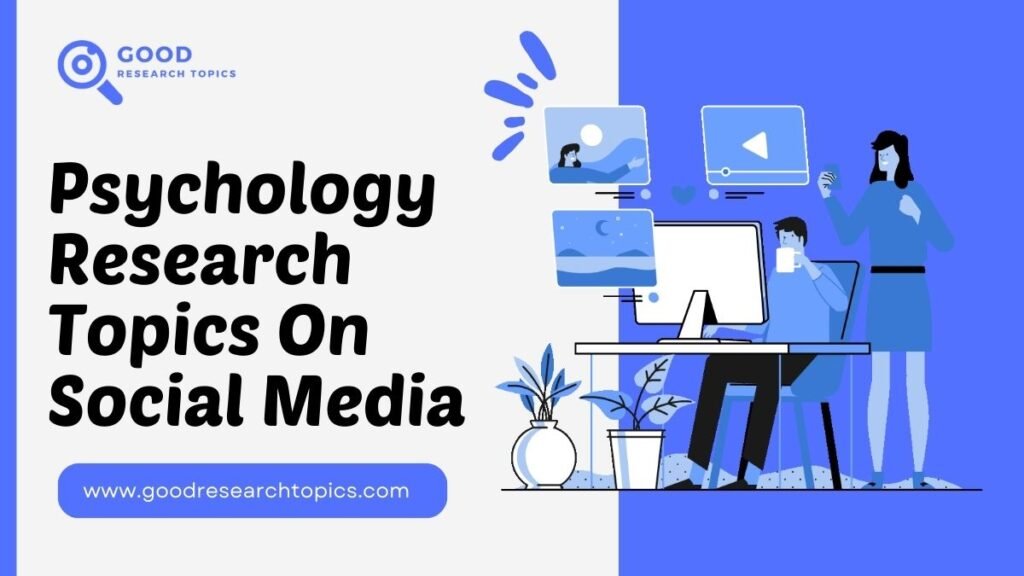Discover psychology research topics on social media. Explore how platforms like Facebook and Instagram affect emotions, relationships, and identity. Dive into the fascinating world where psychology meets digital culture to understand online behavior and well-being.
Hey, let’s chat about something cool: how social media messes with our heads! You know those apps we’re always scrolling through? Well, psychologists are digging into how they make us feel and act.
Ever felt weird after spending too much time online? Or noticed it affecting your friendships? Yeah, we’re gonna uncover all that! So, grab a seat and let’s dive into the wild world of social media and psychology!
The Impact of Social Media on Mental Health
Here we go:-
Ups
- Connection Boost: Bridging distances, fostering community.
- Self-Expression Hub: A platform for showcasing identities.
- Info Access: Help and support at your fingertips.
- Stigma Smasher: Raising awareness, fighting taboos.
Downs
- Comparison Trap: Feeling inadequate amidst curated lives.
- Bullying Hub: Mean comments, hurtful messages.
- Screen Addiction: Lost sleep, neglected real-life ties.
- Body Image Stress: Unrealistic standards, low self-esteem.
Stay Balanced
- Time Limits: Breaks and bedtime breaks from scrolling.
- Positive Feeds: Follow accounts that uplift you.
- Real Connections: Prioritize face-to-face chats.
- Be Kind to Yourself: Remember, online isn’t always real.
- Get Help if Needed: Seek support if social media brings you down.
Remember, a mindful approach to social media can boost well-being while dodging pitfalls.
Emerging Trends in Social Media Psychology Research
Social media is a treasure trove for psychologists! Here’s what’s hot in social media psychology:
Algorithms at Work
- How they keep us hooked and shape our views.
- Spotting bias and discrimination in algorithm design.
Influencer Insights
- How influencers affect our trust and what we buy.
- The dark side: mental health impacts and authenticity concerns.
Mental Health Matters
- Beyond depression: exploring loneliness and FOMO.
- Cyberbullying’s toll: from PTSD to suicidal thoughts.
Social Movements Online
- Mobilizing for change: social media’s role in activism.
- Fighting fake news and building solidarity online.
Navigating Ethical Challenges in Studying Social Media Behavior
Navigating the Ethics of Social Media Research Studying social media behavior is like trekking through an ethical jungle. Here’s your survival guide:
Clear Communication
- Make sure participants know what’s up and can bail if they want.
- No tricks—be honest about what you’re studying.
Privacy Matters
- Keep identities safe by anonymizing data and locking it up tight.
- Only keep what you need, and toss it when you’re done.
Stay Fair and Kind
- Watch out for biases and protect vulnerable folks.
- Don’t mess with emotions—keep it chill for everyone.
Tell It Like It Is
- Be upfront about where your data comes from and how you got it.
- Keep it real when reporting findings—no hiding the truth.
Extra Tips
- Get the thumbs up from the review board and sort out who owns the data.
- In short, play by the rules, keep it real, and respect people’s privacy. That way, we can all learn more about social media without causing a fuss.
Popular Research Methods in Social Media Psychology
Exploring Social Media: How We Study It
Surveys
- Online surveys collect data on attitudes and behaviors.
- Social media polls reach specific groups but may have biases.
Observational Research
- Analyzing user behavior without interacting directly.
- Experience Sampling Methods offer real-time insights into usage patterns.
Content Analysis
- Automated tools and manual coding analyze themes and sentiment.
- Time-consuming but provides in-depth understanding.
Experimental Research
- Lab experiments isolate cause-and-effect relationships.
- Online experiments offer real-world insights with some limitations.
Qualitative Methods
- Focus groups and interviews delve into user experiences.
- Rich insights into motivations and emotions.
Choosing the Right Method
- Surveys for large-scale data on attitudes.
- Observational research for natural settings.
- Content analysis for understanding themes and emotions.
- Experimental research for cause-and-effect.
- Qualitative methods for rich insights.
By using these methods, we unravel the complex world of social media and its impact on our lives.
Psychology Research Topics on Social Media
Check out some of the best psychology research topics on social media:-
Social Media Addiction
- Causes of social media addiction.
- Impact on mental health.
- Managing social media addiction.
- Gender differences in addiction.
- Parental role in adolescent addiction.
Cyberbullying and Harassment
- Effects on victims.
- Anonymity’s role.
- Prevention strategies.
- Long-term consequences.
- Platform comparison.
Self-Presentation and Identity
- Social media’s effect on self-esteem.
- Cultural self-presentation differences.
- Authenticity vs. curation.
- Digital identity formation.
- Disclosure patterns.
Social Comparison and Envy
- Social media’s role in comparison.
- Envy and depression.
- Coping with envy online.
- Influencer impact on comparison.
- Gender differences in envy.
Online Relationships and Support
- Romantic relationships online.
- Social support during crises.
- Online community influence.
- Trust and deception.
- Friendship quality online.
Privacy Concerns and Behavior
- User perceptions of privacy.
- Privacy settings’ impact.
- Psychological privacy factors.
- Trust after privacy breaches.
- Protecting privacy strategies.
Digital Well-being and Health
- Digital detox effects.
- Screen time and well-being.
- Social media’s mental health benefits.
- Online mental health interventions.
- Digital mindfulness practices.
Social Influence and Persuasion
- Influencers’ impact.
- Persuasive marketing techniques.
- Social media activism.
- Political echo chambers.
- Content virality factors.
Cross-Cultural Studies
- Cultural differences in usage.
- Communication styles impact.
- Cultural perceptions of social media.
- Etiquette in different cultures.
- Globalization’s influence.
Online Education and Learning
- Social media’s role in online learning.
- Collaborative learning online.
- Distractions’ academic impact.
- Online teacher-student dynamics.
- Student engagement strategies.
Digital Literacy and Critical Thinking
- Developing digital literacy.
- Evaluating online information.
- Critical thinking online.
- Responsible social media use.
- Combating misinformation.
Behavioral Economics and Social Media
- Behavioral economics on platforms.
- Social media’s consumer impact.
- Nudges’ online effectiveness.
- Social media ads’ influence.
- Online reviews’ power.
Online Gaming and Communities
- Gaming community motivations.
- Virtual friendships.
- Gaming addiction effects.
- Social media in gaming.
- Virtual reality’s social impact.
Technological Innovations and Experience
- User experience design.
- New tech on social media.
- Personalization algorithms’ impact.
- Ethical UI considerations.
- Accessibility in design.
Online Communities and Capital:
- Building social capital online.
- Trust in virtual communities.
- Social media’s cohesion role.
- Community engagement strategies.
- Social influence in groups.
Influencer Culture and Marketing
- Influencer impact on behavior.
- Credibility in influencer marketing.
- Authenticity vs. sponsored content.
- Ethical influencer practices.
- Long-term brand trust.
Social Media and Political Engagement
- Social media’s political role.
- Echo chambers’ effects.
- Online political polarization.
- Social media’s voter impact.
- Political misinformation.
Social Media and Parenting
- Parental mediation strategies.
- Parental online impact.
- Online safety talks.
- Risks for adolescents.
- Digital citizenship education.
User-generated Content and Creativity
- Content creation motivations.
- Impact on brand engagement.
- Creating viral content.
- Collaborative creativity online.
- Copyright and ethics.
Social Media Analytics and Data Privacy
- Ethical data use.
- Privacy concerns in analytics.
- Algorithm fairness.
- User trust and privacy.
- Data security strategies.
Health Communication and Social Media
- Health campaigns’ effectiveness.
- Online health support.
- Social media’s health impact.
- Ethical health promotion.
- Misinformation risks.
Online Privacy and Trust
- Trust-building strategies.
- User data perceptions.
- Privacy breaches’ trust impact.
- Online trust formation.
- Protecting online privacy.
Influencer Marketing and Consumer Behavior
- Influencers’ consumer impact.
- Psychological consumer responses.
- Authenticity in marketing.
- Ethical influencer practices.
- Long-term brand trust.
Digital Well-being and Screen Time
- Screen time’s mental health effects.
- Promoting digital well-being.
- Screen time and physical health.
- Digital detox benefits.
- Reducing screen time strategies.
Online Learning and Educational Technology
- Social media in online learning.
- Collaboration online.
- Distractions’ academic impact.
- Online teacher-student dynamics.
- Student engagement strategies.
Mental Health and Social Support
- Social media’s mental health impact.
- Online mental health support.
- Peer support networks.
- Stigma reduction online.
- Ethical mental health promotion.
Cyberbullying and Online Harassment
- Effects on victims.
- Anonymity’s role.
- Prevention strategies.
- Long-term consequences.
- Platform comparison.
Digital Literacy and Online Safety
- Developing digital literacy.
- Online safety practices.
- Education for safe behavior.
- Cybersecurity risks.
- Digital citizenship education.
Social Media Influencers and Consumer Behavior
- Influencers’ consumer impact.
- Psychological consumer responses.
- Authenticity in marketing.
- Ethical influencer practices.
- Long-term brand trust.
Online Relationships and Social Support
- Online romantic relationships.
- Crisis support online.
- Online community influence.
- Trust and deception online.
- Friendship quality online.
Social Media and Political Engagement
- Social media’s political role.
- Echo chambers’ effects.
- Online political polarization.
- Social media’s voter impact.
- Political misinformation.
Digital Well-being and Mental Health
- Digital detox effects.
- Screen time and well-being.
- Social media’s mental health benefits.
- Online mental health interventions.
- Digital mindfulness practices.
Social Comparison and Envy
- Social media’s role in comparison.
- Envy and depression.
- Coping with envy online.
- Influencer impact on comparison.
- Gender differences in envy.
Online Privacy and Trust
- Trust-building strategies.
- User data perceptions.
- Privacy breaches’ trust impact.
- Online trust formation.
- Protecting online privacy.
Online Gaming and Virtual Communities
- Gaming community motivations.
- Virtual friendships.
- Gaming addiction effects.
- Social media in gaming.
- Virtual reality’s social impact.
Online Education and Learning
- Social media in online learning.
- Collaboration online.
- Distractions’ academic impact.
- Online teacher-student dynamics.
- Student engagement strategies.
Behavioral Economics and Social Media
- Behavioral economics on platforms.
- Social media’s consumer impact.
- Nudges’ online effectiveness.
- Impact of social media ads.
- Online reviews’ power.
Social Influence and Persuasion
- Influencers’ consumer impact.
- Persuasive marketing techniques.
- Social media activism.
- Political echo chambers.
- Content virality factors.
Cross-Cultural Studies
- Cultural differences in usage.
- Communication styles impact.
- Cultural perceptions of social media.
- Etiquette in different cultures.
- Globalization’s influence.
Privacy Concerns and Online Behavior
- User perceptions of privacy.
- Privacy settings’ impact.
- Psychological privacy factors.
- Trust after privacy breaches.
- Protecting privacy strategies.
These topics provide a concise overview of potential research areas in psychology related to social media.
List of 200+ Psychology Research Topics on Social Media Pdf
Here is the list of the psychology research topic on social media pdf:
Challenges in Drawing Conclusions from Social Media Research
Social media research is like a treasure hunt, but there are obstacles. Here’s what researchers deal with:
Data issues
- People don’t always tell the truth.
- Social media users aren’t everyone.
- Online personas might not be real.
Platform problems
- We can get stuck in a bubble.
- Algorithms push certain stuff.
- It’s hard to know who’s genuine.
Ethics and privacy
- Getting permission can be tough.
- Keeping info safe is vital.
Finding cause and effect
- Just because two things happen together doesn’t mean one causes the other.
- Lots of stuff beyond social media affects behavior.
Keeping up
- Social media always changes.
- New things pop up all the time.
How to handle it
- Use different methods to understand.
- Be honest about what we know.
- Look for patterns, not definite answers.
- Long-term studies help track changes.
Despite challenges, researchers can unlock the secrets of social media’s impact on our lives.
Tips For Choosing A Psychology Research Topics On Social Media
Tips for Choosing a Social Media Psychology Research Topic:
- Follow Your Interests: Pick something about social media that interests you, like how it affects mental health or influences buying decisions.
- Find Research Gaps: Look for areas where we don’t know much yet, like how social media impacts certain groups or new trends.
- Narrow Your Focus: Instead of big topics, zoom in on specific questions, like how Instagram affects body image in teens.
- Be Practical: Consider what you can realistically study with your resources and time.
- Stay Ethical: Make sure your research follows the rules, especially about privacy and consent.
Research Ideas
- How social media stars influence teen behavior.
- Ways social media can boost or hurt self-esteem.
- The link between loneliness and social media use.
- How anonymity online affects bullying.
- Social media’s role in supporting people with illnesses.
- Exploring extreme views on social media.
- The effects of taking breaks from social media.
- New tech and its impact on social interactions.
Choose a topic that excites you and helps us understand more about social media and people.
What is the best topic for research on social media?
Finding the perfect social media research topic isn’t easy, but considering your interests and what’s trending can help. Here’s how:
What’s Trending
- Look at how social media algorithms affect what we see.
- Check out the rise of influencers and their impact.
- Explore how social media affects mental health beyond depression.
Society and Tech
- Study how social media influences social movements.
- Think about the future with VR/AR tech.
Who’s Left Out
- Check out different age groups, like kids or older adults.
- Focus on specific platforms, like TikTok or Twitch.
Examples
- How Instagram’s algorithms affect how teens see themselves.
- Can social media help older adults feel happier?
- Exploring bullying on gaming platforms with anonymous accounts.
- How online communities support people with disabilities.
- Does bias on social media affect how we see politics in underserved areas?
Remember
- Does your topic fill a gap in what we know?
- Can you actually do the research with what you have?
- And can you do it ethically, respecting people’s privacy?
Hope this helps you find the perfect topic for your social media research!
What are examples of possible research topics in psychology?
Psychology offers a lot of research options. Here are some simple examples:
Cognitive Psychology
- How meditation affects memory.
- Using repetition for better memory.
- Bilingualism’s impact on thinking.
- Artificial intelligence and decision-making.
- Creativity and brain activity.
Developmental Psychology
- Screen time’s effects on kids.
- Parenting styles and teen self-esteem.
- Teaching empathy to children.
- How thinking changes with age.
- Social media and teen body image.
Social Psychology
- Training to help in emergencies.
- How groups influence decisions.
- Social media spreading prejudice.
- What attracts people romantically.
- Loneliness and mental health.
Personality Psychology
- Personality and career choices.
- Nature versus nurture in personality.
- Personality tests and job performance.
- Leadership styles and personality.
- Culture and personality expression.
Clinical Psychology
- Mindfulness for anxiety.
- Therapy for teenage depression.
- Culture and mental health treatment.
- Online therapy for better access.
- New tests for diagnosing disorders.
Health Psychology
- Stress relief techniques.
- The power of social support.
- Following medical advice.
- Media’s impact on health.
- Mental and physical health link.
Keep it simple, and pick what interests you most!
How does social media relate to psychology?
Social media and psychology are closely connected:
Impact on Mental Health
- Seeing perfect lives can make us feel bad.
- Too much negativity online can worsen anxiety and depression.
- Always seeing others having fun can make us feel left out.
Social Interaction and Identity
- It helps us stay connected and find support.
- Expressing ourselves online boosts confidence.
- Anonymity online can lead to hurtful behavior.
Cognitive Processes and Attention
- Social media keeps us scrolling longer.
- We mainly see stuff that agrees with us.
Social Media’s Role
- It helps spread awareness and organize movements.
- False info spreads easily.
- New challenges will arise as platforms evolve.
Psychology Guides Design
- Understanding how we think helps make better platforms.
- Psychologists can advise on making social media more positive.
What is a sociological topic that is related to social media?
Here we go:-
- The Digital Divide: Who has internet access and who doesn’t. It affects jobs and connections.
- Social Class: Rich and poor use social media differently. Rich use it for work, poor for fun.
- Socialization: Learning about society and connecting with others. But can also lead to cyberbullying.
- Social Movements: Using social media to organize protests and events.
- Misinformation: False info spreads fast online, like COVID-19 rumors.
These points show how social media impacts our lives and society.
Conclusion
To wrap things up, diving into psychology research about social media helps us understand how our online habits affect our daily lives. Whether it boosts our confidence or changes how we interact with others, studying these areas gives us useful insights for navigating the digital world.
And as technology keeps evolving, we’ll keep learning how social media impacts us, making our online experiences even better.



